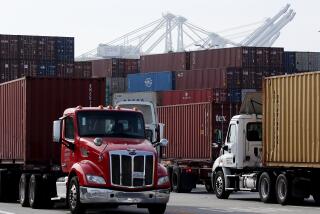Truckers’ Safety Gets Short-Changed
- Share via
As a truck driver I spend 100,000 miles a year on the nation’s highways. In a very real sense, my livelihood and life depend on government safety agencies to keep the roads safe. In the stressful, often violent world of the interstate, one of the few positive bonds among truck drivers and private motorists is that dependency. When the safety apparatus breaks down, the citizen is obliged to speak out.
I see evidence daily that public safety is jeopardized by the profit-minded policies of state safety agencies. At weigh stations and truck-inspection points across the country the professional driver is obliged to pay exorbitant fines for safety infractions. On my last trip to California I was fined $180 for failure to have an up-to-date logbook, but I was allowed to go on my way without being detained to rest, a practice specifically required by federal motor-carrier regulations. California took my money, but by federal and state standards I was no safer a driver. I left the weigh station feeling that I had been held up by thieves.
The rationale behind the enforcement of the law is clear: Enforce the law in order to make money rather than to make the highways safer. It is disheartening to recognize that those in charge are unable or unwilling to maintain the standards that they themselves have set.
Safety is a self-amortizing public-relations program that only haphazardly decreases the dangers of the interstate. Motor-carrier safety enforcement throughout the country is motivated by financial necessity, not the well-being of the public it serves. As long as truck drivers are at the mercy of shippers, employers and profit-motivated enforcement, public safety will continue to be jeopardized.
California is the starting place for one of the most death-defying trips in the transportation industry. West Coast produce shippers continually promise their customers in New England a delivery date 3 1/2 days from the day of shipment. It is common for a driver to have delivered his load from New England in California after driving the 3,500 miles in four days. His employer tells him to drop his load and deadhead to a produce market where he will load, get a few hours’ sleep and begin the return trip. He will have driven 7,000 miles in eight days when he unloads in New York or the Chelsea market in Boston. He will go home for two or three days before doing the trip again.
A driver in this position, and there are many, drives about 20 hours a day, a grueling task that is both illegal and unsafe. He avoids being caught by using his CB radio to get information about the location of scales and by knowing the back roads around them. Often the driver has more to worry about than his joke book, as the logbook is called. His truck may be overweight; he may not have one of the myriad different permits and operating authorities required by states across the nation. His only chance of doing his job is to avoid contact with safety officials.
As a consequence, the professional truck driver is seen as a public menace. In reality he is a working man with very hard choices to make; he learns to doctor his log rather than pay a fine; he learns to sleep in the 20 minutes it takes to fuel his truck. He learns not to complain when he backs into the dock in Boston after driving through from New Mexico with 45,000 pounds of onions and is told he has to unload them.
The point is that collecting fines for log violations and being overweight does not reduce the hazards created by thousand-miles-a-day delivery schedules and by shippers who have no responsibility to load trucks with legal weight loads. If safety officials are truly concerned about their mandate, they will focus more legislation and enforcement on the executives who make the schedules and overload trucks. They will stop levying fines for safety violations and require that all violations be corrected before the truck is allowed to continue.
When money ceases to influence safety enforcement and when regulations have a direct relation to infractions, the safety Establishment will be a more honest, more effective force for public safety.
More to Read
Sign up for Essential California
The most important California stories and recommendations in your inbox every morning.
You may occasionally receive promotional content from the Los Angeles Times.













